Zootopia and (...the lack of?) power dynamics
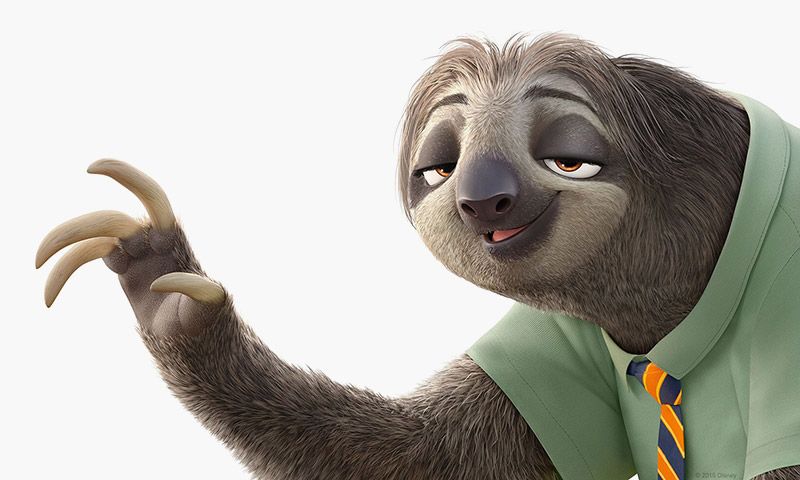
Here be spoilers, you have been warned.
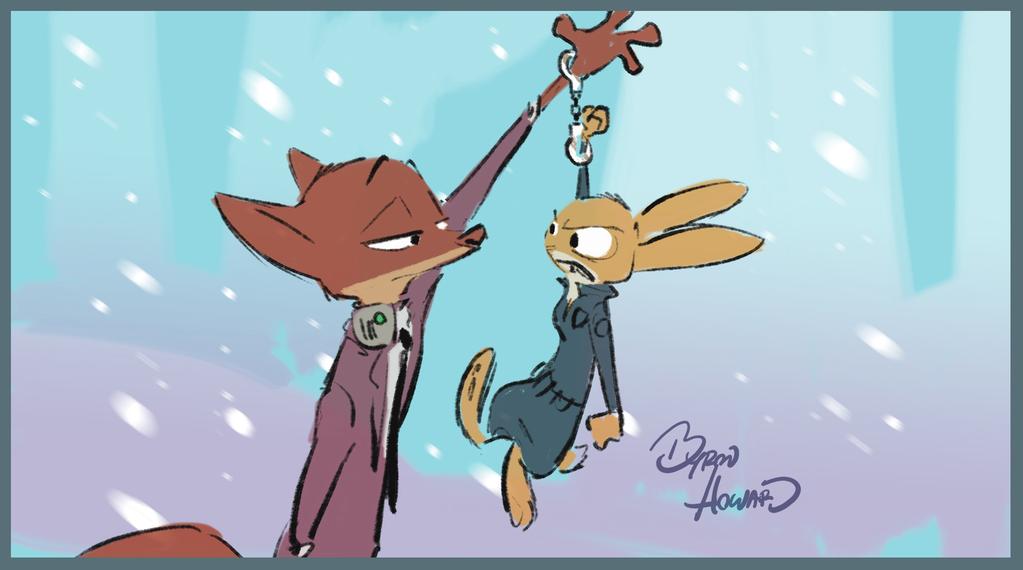
Zootopia is a beautiful movie. There's no doubt about that: the quality of the animation and the cinematography is top-notch.
The visual merits of the film are not what I'm going to be discussing here, however. And as for the plot, I think that as a buddy-cop movie, the film more or less works as a child-friendly animated remix of a film noir. It's worth noting that traditionally, film noir offers a cynicism that would be brutal and jarring in a film that professes to uphold family-friendly values. That cynicism is the strength (or perhaps at least the backbone) of most noir films: it is the expression of a certain hopelessness that, even at the end of the plot, the world is not a better place than it was at the beginning of the film.
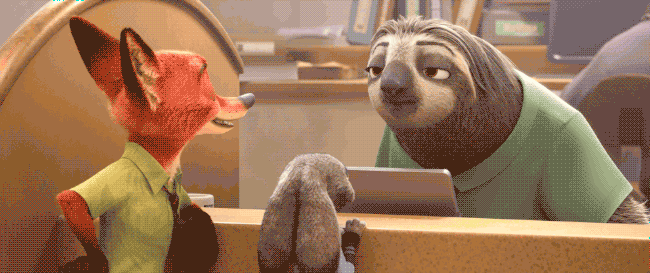
For all of the film's strengths (the animation, certain gags such as the sloths) and as truly grateful as I am that the heroic leads end up not as romantic partners but as platonic partners, certain aspects of the film gave me pause. Not the least because in a world where some of the most pressing concerns affecting the United States are issues of police violence and brutality, and the rising of Black Lives Matter protesters and activists calling for a renewed investment in Black liberation in North America, Disney's timely response to these issues is a buddy cop movie, presented from the perspective of two "outsiders" joining the force: a woman bunny, considered too "cute" and "emotional" for the job, and a man fox, considered "shifty" and "dangerous" as a member of the predator class. It sounds, at the very least to me, a whole lot like a white woman trying to make it in a macho, male-dominated workforce, and how she enlists a man of a visible racial minority to help her break that glass ceiling.
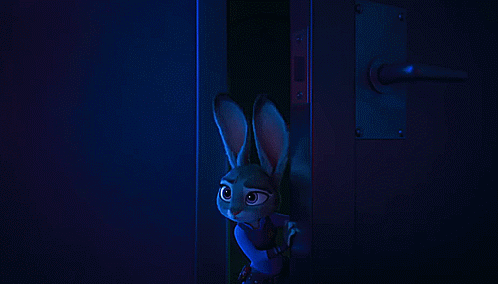
Tangentially, in crafting the two leads for the film, Zootopia probably wanted to channel a little bit of a Mulder and Scully vibe (best expressed in the concept art below and perhaps alluded to by the fact that Mulder's full name is Fox Mulder)—but whereas in The X-Files the alien threat and governmental conspiracies present, at least some of the time, a hierarchy of power and oppression with which the show uses to craft its tale of two FBI agents against the world, Zootopia doesn't strike nearly so clear a chord.
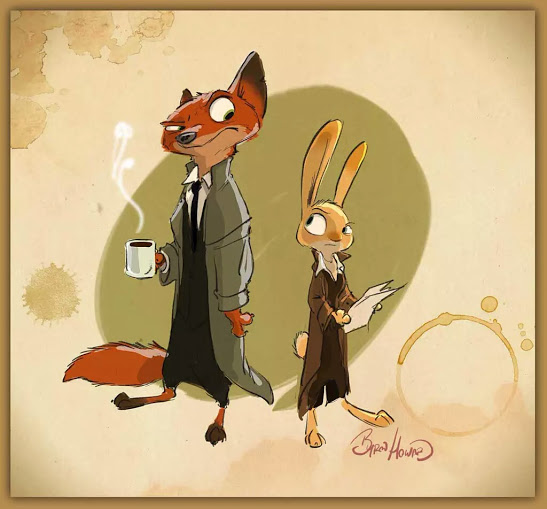
And this is by design, as I discovered while googling for concept art for the film. In the film's world-building, it's explicitly noted by the main characters that Zootopia is not the utopia it professes to be. Deep undercurrents of resentment colour the experiences of it's furry citizens—but that seems to be where the real life parallels stop short. In Zootopia the resentment goes both ways between all parties in equal distribution, and historical foundations for resentment and discrimination are based in a history that took place thousands of years ago, a history that is now long dead. When it comes to expressing parallels to real-world hierarchies of power and structural oppression, Zootopia misses the mark by a lot, in a purposeful move as described by the creators of the film themselves:
The story which felt all kinds of crooked at that time, almost instantaneously had a spine that straightened and suddenly the world felt like a world we could relate to, like our world. It didn’t feel like a movie dystopian world. Then the world became like what it was always imagined to be, that it felt like Miami or LA or New York or Paris or Rome, a big vibrant melting pot that you can find good and you can find bad. Not a place that had an agenda to keep one group down from the beginning. It’s a case of the story saying “this is what I really want to be.” When the story does that, it’s an organic thing and you have to follow that. (Byron Howard, interview with slashfilm.com)
I find that move away from the dystopia to be an interesting one—and I might want to note that from certain point of view, "our world" might certainly look a lot like a dystopia.

In Zootopia, there are iPhone-lookalikes and cars, public transportation, mob bosses and police officers. The city of Zootopia does look a whole lot like the shining metropolises of North America. The film is begging you to draw real world comparisons, most notably as demonstrated in the trailer of the film, when officer Judy Hopps, the Very First Bunny Cop, tells a fellow cop (who is also part of a visible minority, predators, in the film) that only bunnies can call other bunnies "cute". The film is asking you to draw real-world parallels, but not really telling you which real-world parallels—and to the filmmakers it probably doesn't matter which real-world parallel the viewer settles on. In that scene, the film could be telling you to draw a comparison with many real life examples of racial slurs, gendered slurs, or sexual orientation slurs that have been re-appropriated by marginalized communities. There's a danger to that lack of specificity, not in the least because it assumes that any variation from a default is interchangeable with any other variation from the default, and it completely blurs all "minorities" into one indistinct category. This erases the specific histories of minority communities, and most importantly erases any history of the root cause of discrimination and oppression. Resolving the inequality between the two traditional binary sexes (male and female) is not the same as dealing with the issues and stakes of the queer community, or the transgender community. The liberation of Black people in the United States (and Canada, let's not forget) will not be the same as the decolonization of Indigenous people and land in North America.
When I first saw the trailer for the film, I was mostly awed by how overtly Disney was tackling what looked like the racial struggle in America. In retrospect I suppose I should not be quite so surprised that their solution to racial discrimination in law enforcement is to offer a story in which the solution is for visible minorities to join law enforcement and change the culture from within, because in Zootopia, the work starts and ends with individual outlooks and actions.
The move to turn Zootopia into the message of "you can be whoever you want to be", as well as the message: "we all carry discrimination in our hearts and have to be better to each other" definitely doesn't seem like a bad message, at first glance—but that also sets up the argument that if we're all discriminating against each other equally, it means that everybody is being discriminated against equally. That's a very difficult message to take lying down. And while I'm certain I'll hear the argument that the reason the film refuses to talk about systemic discrimination and power dynamics is because of the children watching the film, I'm still disappointed that a production company with the budget and resources of the Disney mega-empire decided to proudly hang the banner of "All Lives Matter" on their buddy-cop story.
¯\_(ツ)_/¯
